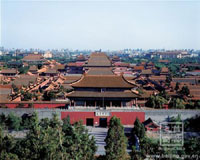Palace Museum moves forward on improvements
The Palace Museum is recovering from scandals - ranging from an embarrassing burglary to allegations of cover-ups of damaged antiquities - after a year of effort.
The world's biggest and best-preserved ancient royal architecture complex, the Palace Museum received 15.3 million visitors during 2012. Its website has attracted an average of more than 1 million clicks every day.
Throughout the year, there were six major exhibitions in the museum, while 13 touring exhibitions traveled nationwide. About 170 books were published and 261 cultural relics were repaired. And now the museum's automatic guide device contains 40 languages or dialects. It also has an array of audio guides, including a story version and a teenage version.
In the area of security, there were 29 closed-door drills within the museum. A new security system will complete an upgrade by the end of this year, and a new fire-control system will be installed by the end of 2014.
"The museum is getting better without losing any historic flavor," says Palace Museum Director Shan Jixiang.
At the same time, the museum is facing various challenges, he says. For example, there are still modern buildings constructed in different time periods within the museum complex - and the municipal facilities do not match the architecture style.
In March, the director says, a row of houses will be constructed outside the imperial Red Wall. All the academic institutes located within the imperial palace will move out to the houses. By 2020 there will be no modern buildings in the palace.
All the measures will be strengthened by a new project titled "The Safe Palace Museum".
Also, a new protection center for cultural relics is being developed, which will be responsible for repairing defective items such as furniture, carpets and heating stoves.
The Goose Wing Buildings (Yan Chi Lou) at both sides of the Meridian Gate (Wu Men) will be put to use this year as exhibiting space. In 2015 a major exhibition to celebrate the 90th anniversary of the Forbidden City's transformation into the Palace Museum in 1925 will be presented here.
And the exhibiting categories are being refined at the same time.
|
 |
The Southeast Turret will be used as the exhibiting hall for architecture antiques. The Imperial Kitchen (Yu Shan Fang) will become an ancient furniture exhibition hall. The Hall of Consolation of Mothers (Ci Ning Gong) will be the hall of sculpture. And the unfinished Western-style Palace of Prolonging Happiness (Yan Xi Gong) will be the place for presenting Western antiques.
Meanwhile a digital museum at the southern-end main entrance (Duan Men) is being planned. More drinking water stations and toilets will be installed in the square outside the entrance.
Despite the increasing number of visitors, Shan says, the Palace Museum will not raise the ticket price to limit the flow, in consideration of the potential effect on other museums.
Instead, they are working on other ideas to ease the flow. One idea: compulsory in-advance online ticket purchase for group visitors during peak seasons. And visitor numbers could be controlled in fragile places like the Imperial Garden.
"By 2020, when the Forbidden City celebrates its 600th birthday, we hope to open it without any safety hazards," Shan says.
zhangzixuan@chinadaily.com.cn
??




















